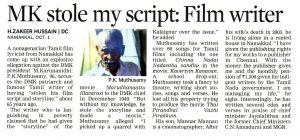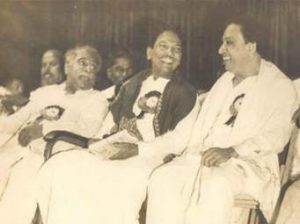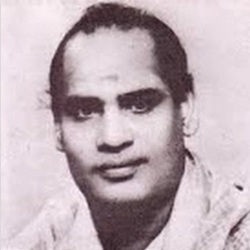About the Plagiarism charge on Karunanidhi
by Sachi Sri Kantha, May 5, 2019
In Part 48, I commented on MGR’s own selection of his best movies. Among the 14 movies, the second in his list Marutha Naatu Ilavarasi (The Princess from Marutha Nadu,1950; produced by G. Govindan & Co.) was in the news three years ago, about a plagiarism charge against the script writer of that movie, M. Karunanidhi. Thus, it may not be inappropriate to review how the two principals (Karunanidhi and MGR) involved had covered the background related to this particular movie.
P.K. Muthusamy (then a 96 year old Tamil movie lyricist and living in penury) accused Karunanidhi for stealing the script of Marutha Naatu Ilavarasi from him. This accusation appeared in the Deccan Chronicle newspaper on Oct.2, 2015.

Plagiarism charge on Karunanidhi by lyricist Muthusamy, 2015 Oct 4
Within two days, the Deccan Chronicle followed it with a news item captioned, “Jayalalithaa announces Rs 5 lakh for Muthusamy” (Oct. 4, 2015). It read as follows:
“Days after Deccan Chronicle carried a news item on nonagenarian Tamil film lyricist P.K. Muthusamy who is languishing in poverty, AIADMK supremo and Chief Minister J. Jayalalithaa, on Saturday announced Rs 5 lakh as gift for his various Tamil works and Rs. 5,000 monthly pension from Puratchi Thalaivar Dr. MGR Trust.
A party statement said the lyrics and stories written by 96 year-old Muthusamy are still popular among film buffs. He has also written books and poems in praise of Jayalalithaa. AIADMK supremo announced the financial assistance as part of her endeavor to protect and encourage Tamil writers.
Muthusamy has written over 60 songs for Tamil films, including the one titled ‘Chinna Nadai Nadanthu Vandhu’ in the movie ‘Kaveriyin Kanavan’. A school drop-out, he took a fancy to theatre, writing short stories, songs and verses. He lost his property trying to produce the movie, ‘Thai Pirandhal Vazhi Pirakkum’.”
The beginning line mentioned above for that very popular lullaby in the Kaveriyin Kanavan [The husband of Kaveri] was in error. It should be, ‘Chinna china nadai nadanthu – Sempavala Vaai thirandu’, sung by P. Susheela. Jayalalitha had died on Dec.5, 2016. The youtube link for this wonderful song is as follows:
https://www.youtube.com/watch?v=fRcR6Jb57So
Karunanidhi had died on Aug. 7, 2018. I’m not sure, whether Muthusamy is still alive or not. It’s to the credit of Muthusamy that he had raised this plagiarism issue, while Karunanidhi was still alive. How did Karunanidhi respond for this accusation, as of now, I don’t have any information.
From the autobiographies of Karunanidhi and MGR
Nevertheless, I did check the autobiographies of both, MGR (2 volumes) and Karunanidhi (6 volumes), for any details on the story line and production of this Marutha Naaatu Ilavarasi movie. This movie was released on April 2, 1950, and was 3rd in the list of Karunanidhi-scripted movies.
Strangely, Karunanidhi had been ‘silent’ on this movie. In chapter 19 (vol.1), he had described the first two movies – Rajakumari (1947) and Abhimanyu (1948), in which he worked as the script writer. Both movies were produced by Jupiter Pictures. He had written about his disappointment in not seeing his name listed in the credit role for Abhimanyu movie, and questioning the producer about it. Producer Somasundaram had responded that his (Karunanidhi’s) name would appear, when he gains some recognition of sort. At least, for his debut performance as a script writer for the Rajakumari movie, Karunanidhi’s name did appear in the credits as ‘uthavi aasiriyar’ (assistant in scripting). Miffed by this type of rejection for his second attempt in script writing, Karunanidhi had written that he returned to Tiruvarur, from Coimbatore or Koyamputtur (Kovai). After ten more chapters providing details about how he spent time in 1949, in chapter 30, Karunanidhi makes passing mention about scripting the MGR hit movie of Modern Theatres, ‘Manthiri Kumari’ (1950). This movie was released on June 24, 1950, two months after the release of Marutha Naatu Ilavarasi.
Compared to Karunanidhi’s evasion, MGR was more revealing in providing the details of the production of Marutha Naatu Ilavarasi, and his personal travails in the relationship with actress V.N. Janaki (later to be his 3rd wife), in two chapters 112 and 113. The titles of chapter 112 and 113 were ‘Marutha Naatu Ilavarasi’ and ‘The Result from Self-Respect’ respectively. I provide below excerpts of what MGR had described on the development of story plot for this movie and his appreciation of Karunanidhi’s skills.
“Previous name for this ‘Marutha Naatu Ilavarasi’ was ‘Kaali Dasi’. The one who took responsibility as heroine for ‘Kaali Dasi’ was the late excellent singer M.S. Anuradha from Tanjavur. Late Mr. T.V. Chari, a shareholder of the production company, was responsible for story, script and direction. Due conflict of interests between him and the producer of the movie, the company was dissolved. Then, another one Govinda Company took charge and using few of the previously shot scenes, songs and the climax fight scene, weaved a new story. To this story, the script writer was the Chief Minister of Tamil Nadu, Dr. Kalaignar [Karunanidhi]. Director: Mr. A.Kasilingam, and heroine Mrs. V.N. Janaki….
Dr. Kalaignar and Mr. Kasilingam stayed at Nadar Mansion hotel. Kalaignar wrote story at night. During day time, at the number 147 house at Netaji Subash Chandrabose street (where we stayed), discussion of the story took place with Kalaignar, Kasilingam, my brother and me. When we discussed the partly written story, we used a new technique. Whatever was discussed on the previous day, Kalaignar would continue writing the plot.
Kalaignar would never talk in support of what he had written. He would comment on the fault lines of what he had already written and rebut against what he had written. We took the opposite view and support the realistic, reasonable links in the plot. Only when both sides agreed to a common version, we move to the next section. It was like this, the story plot for ‘Marutha Naatu Ilavarasi’ was formed.

Anna, Karunanidhi and MGR
Though I had met many who couldn’t have patience in listening to the faults of their own story plots, I was so surprised by the opposing stance taken by Kalaignar. Furthermore, I came to respect his talent and skill in composing the script. He had the gift of writing without any corrections and revision, akin to that of Arignar Anna. He don’t force himself to write in poetic style. It effortlessly enters his prose.”
Then, MGR had described his travails as (1) a mediator between the producer (who was hard of cash flow) and other actors related to their fees, (2) a stunt coordinator for the movie, and most importantly, (3) his personal issues in getting the consent for marriage from the guardian of his heroine-flame Janaki. However, the name of P. K. Muthusamy is not mentioned even once by MGR, related to the story line of this movie.
Based on the descriptions provided by MGR on the development of the plot from a previous version produced by a different company and the director as well as the production troubles faced by the second company that took over the production of the Marutha Naatu Ilavarasi movie, one can assume that the plot for the movie might have evolved from the Muthusamy’s conception. Thus, one can give the benefit of doubt to Karunanidhi. Nevertheless, his silence about this movie in his autobiography, as opposed to the ‘bragging’ of his contribution to the subsequent Manthiri Kumari movie released in the same year also hides some unpleasant facts which he wished to hide, and omissions seems to be deliberate.
Why Muthusamy waited for 65 years to accuse Karunanidhi, when both had turned into nonegenarians, is also a moot point. May be, Muthusamy had to deal with a luckless card that fate had served him, while Karunanidhi and MGR had risen in their ranks in politics and power. After Karunanidhi’s death last year, I do recognize a revisionist version is being propagated by his admirers that he was a ‘genius’ in Tamil script writing and his scripts alone promoted MGR to stardom. Here is an example from an eulogy by Subagunarajan, identified as ‘a film critic and researcher/theatre person and Dravidian research enthusiast’:
“After Rajakumari and Abhimanyu, both of which had MGR in a lead role, Karunanidhi ‘doctored’ the script of Marutha Nattu Ilavarasi (this film had MGR and his future wife V.N. Janaki in lead roles), as the producers were not satisfied with the script and, as aconsequence, held up the production. This act of ‘doctoring’ the script become a talking point in the industry and played a role in Karunanidhi getting an invitation from Sundaram.”
What is this so-called ‘doctoring’ the script? Is it revising, or adapting a previously available version of another author, without due acknowledgment to the source? It seems to me that Subagunarajan had pointedly ignored MGR’s version of how Marutha Nattu Ilavarasi was developed. He also had opined as below:
“MGR had been a sidekick for more than a decade. Although his association with Karunanidhi started with Rajakumari (1947), he was launched into stardom with Manthiri Kumari (1950), which was his first assignment as an independent hero. This was made possible through Karunanidhi’s intervention. The credit for the success of Manthiri Kumari goes to Karunanidhi, who shouldered the burden of the story, screenplay and dialogue.”
In another occasion, the same article mentions that “On Karunanidhi’s recommendation MGR was cast as hero in the movie [Manthiri Kumari].” If this was so, Karunanidhi would have bragged about this in his autobiography, written after his fall out with MGR in early 1970s. But, Karunanidhi does not mention this fact. He simply had stated that “The proprietor of the Modern Theatres Mr. T.R. Sundaram expressed his wish to produce my drama ‘Manthiri Kumari’ into a movie. I did agree and completed writing the story and script according to the movie.” Subsequently, he had bragged about his comeuppance comment to a poor astrologer who was invited to give a shooting commencing date, after this guy was introduced to him. Karunanidhi do not mention that it was he who recommended MGR to the hero role for this Manthiri Kumari movie. Interestingly, MGR did not consider ‘Manthiri Kumari’ movie as one of his significant, trend-setting movies of his career!
In another feature that appeared in the Frontline magazine’s ‘special issue’ on Karunanidhi last year, A.S. Paneerselvan (a biographer of Karunanidhi) had written that Karunanidhi “wrote the entire screenplay and dialogues for the film (Marutha Naatu Ilavarasi) within three weeks”. Both Subagunarajan and Panneerselvan had deftly ignored the 2015 plagiarism claim of Muthusamy in their eulogies.
A Previous claim against Karunanidhi
It should be noted that, Muthusamy’s claim of plagiarism by Karunanidhi is not the only one in which the latter was involved with a Tamil movie script. Even in 1965, none other than poet-lyricist Kannadasan also accused Karunanidhi for an unwarranted claim for a movie script, in the first volume of his autobiography, Vanavaasam. According to Kannadasan, the concerned movie script was Illara Jothi (1954; The Light of the House, which starred Sivaji Ganesan and Padmini), produced by Modern Theatres and released on April 9, 1954. At that time, both Karunanidhi and Kannadasan were in the DMK party and were involved in the Dalmiyapuram name changing agitation. Both spent time behind the bars, as lead participants of this agitation.
This is what Kannadasan had written on this episode, in third person singular.
“He begged T.R. Sundaram [the owner producer of Modern Theatres] to give at least 500 rupees. He had refused sternly, ‘I cannot give money’. With disappointment and tears he prepared himself to return to his village that evening. T.R. Sundaram visited the rehearsal hostel that evening. He went to meet him to say farewell. When he saw him, he relaxed his stance, and asked, ‘Can you write the story and script for a full movie?’ He replied, ‘I’ll write’. He told his manager to give him 500 rupees. The condition was that, he had to stay at Salem, except on occasion when he had to produce himself in police station for legal routine. He was allowed for this concession 8 days, in two months. During this time, he completed writing the story, script and songs for ‘Illara Jothi’ movie.” (chapter 32)
Kannadasan’s accusation on Karunanidhi’s plagiarism was hinted by using a Tamil phrase ‘Kalai Nanbar’ [Friend of Art] as an euphemism. By that time, all Tamils could identify the person to whom it referred to. To translate what Kannadasan wrote,
“At that time, his ‘Kalai Nanbar’ had published the first issue of his paper. In it, he had mixed some poison about him too. While he was in prison, the ‘Illara Jothi’ to which he had written the script had been released and turned into a flop at box office. That friend had written that a portion of the script was written by him. [that is, Karunanidhi]” (chapter 35)

Chidambaram S. Jayaraman
Karunanidhi had remained silent on this finger pointing act of Kannadasan, in his autobiography. In the chapter ‘My Contribution to the Art’, he had listed 22 movies he had scripted between 1947 and 1963. But, ‘Illara Jothi’ was excluded from this list. If he had authentically contributed even a portion of the script for this movie, why did he omit this from his list?
Coda
One should also add that Karunanidhi had been less than forthcoming in giving credit to others for his entry into the movie world, especially his brother in law and popular singer Chidambaram S. Jayaraman (1917-1995). Seven years older than Karunanidhi, and having established himself as an actor and singer in the arena, anecdotal evidence compiled by Karthik Madhavan indicates that it was Jayaraman who had solicited favor from a few established hands to find a placing for his brother in law and it was he who invited Karunanidhi to Coimbatore to work at the Jupiter Pictures in 1945. But, Jayaraman’s impressive contributions to the movies, music and to the growth of DMK party barely receives mention in Karunanidhi’s autobiography volumes. Karunanidhi had mentioned only the name of influential director A.S.A. Samy (1915-1998), as his benefactor.
Cited Sources
Kalaignar M. Karunanidhi: Nenjukku Neethi, Part 1, Thirumagal Nilayam, Chennai, 2nd ed., 1985 (orig. published 1975), pp. 95-99, 141-142, 487-489.
Karunanidhi: Cinema for a cause. Frontline (Chennai), Oct. 18, 2013.
Kannadasan: Vanavaasam, 12th ed., 1991 (orig. published 1965), Vanathi Pathippagam, Chennai, pp. 207-208, 225-226.
Kartik Madhavan: The Coimbatore connection. The Hindu (Chennai), Aug 9, 2018.
A.S.Paneerselvan: An artist as a leader. Frontline (Chennai), Aug. 31, 2018.
MGR: Naan Yean Piranthen? – Part 2, chapters 112 and 113, Kannadhasan Pathippagam, Chennai, 2014, pp. 1255-1282.
Subagunarajan V.M.S. Contributions to Tamil Cinema – Scripting Dravida cinema. Frontline (Chennai), Aug. 31, 2018.
It is an open fact that M.K. is one of the most corrupt politicians, but Dr. Sachi have brought out his corrupt nature in the cinema field too. I too heard that Eelam Tamil writer Se. Yoganathan was doing ghostwriting for M.K. for a long time, I am not sure how far it is true, but after reading the material presented by Dr. Sachi, those rumors seem to be likely.